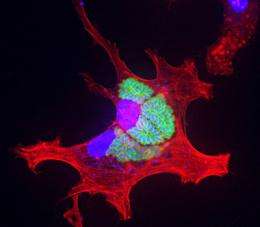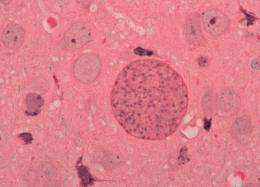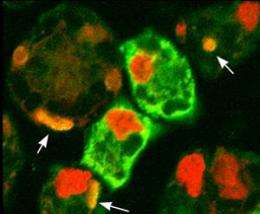'Promiscuous parasites' hijack host immune cells

Toxoplasma gondii parasites can invade your bloodstream, break into your brain and prompt behavioral changes from recklessness to neuroticism. These highly contagious protozoa infect more than half the world's population, and most people's immune systems never purge the intruders.
Cornell researchers recently discovered how T. gondii evades our defenses by hacking immune cells, making it the first known parasite to control its host's immune system. Immunologists from the College of Veterinary Medicine published the study Sept. 8 in PLoS Pathogens, describing a forced partnership between parasite and host that challenges common conceptions of how pathogens interact with the body.
"Toxoplasma is an especially promiscuous parasite," said Eric Denkers, professor of immunology. "It infects nearly all warm-blooded species, most nucleated cell types and much of the human population. Although it lives in vital brain and muscle tissues, it usually causes no obvious reaction. Infection can seriously harm people with weak immune systems, yet most hosts experience no overt symptoms because Toxoplasma has found a way to coerce cooperation."
Famous for its manipulative powers, T. gondii has been shown to alter the brain chemistry of rodents so that they fearlessly pursue cats. Cats eat the rodents, delivering the parasites to their breeding ground in feline intestines. Similar manipulations have surfaced in human studies linking T. gondii infections to behavioral and personality shifts, schizophrenia and population variations, including cultural differences and skewed sex ratios. Denkers' study maps T. gondii's newfound ability to manipulate cells in the immune system at the molecular level.

"We found that Toxoplasma quiets its host's alarm system by blocking immune cells from producing certain cytokines, proteins that stimulate inflammation," said Denkers. "Cytokines are double-edged swords: They summon the immune system's reinforcements, but if too many accumulate they can damage the body they're trying to defend. An unregulated immune response can kill you."
When immune cells meet intruders, they release cytokines that summon more immune cells, which produce more cytokines, rapidly causing inflammation. T. gondii must allow cytokines to trigger enough of an immune response to keep its own numbers in check and ensure host survival. But too many cytokines cause an overwhelming immune response that could damage the host or eliminate the parasites.
"Toxoplasma hijacks immune cells to enforce a mutually beneficial balance," Denkers said. "Until recently we thought it walled itself away inside cells without interacting with its environment. It's now clear that the parasite actively releases messages into cells that change cell behavior."

To prove this, Barbara Butcher, a senior research associate working with Denkers, exposed immune cells in the lab to bacterial factors that typically stimulate the release of inflammatory cytokines.
"Cells infected with Toxoplasma produced no messages to trigger inflammation," Denkers said. "Our colleagues at Stanford University found that Toxoplasma produces a specific protein called ROP16 to suppress inflammatory responses. Collaborating with parasitologists at Dartmouth Medical School, we found that Toxoplasma sends ROP16 to infiltrate communication channels in immune cells, causing them to lower cytokine production.
"We are excited to have found the first non-bacterial pathogen able to exert this kind of control," said Denkers. "If Toxoplasma can do this, maybe other parasites can too. This is the first case where the whole process of immune system manipulation is close to being completely mapped out at the molecular level."
That map may help steer future investigations into how pathogens interact with hosts, unveiling the inner workings of a spectrum of infectious diseases.


















